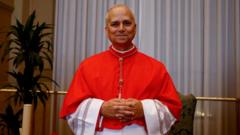The decision by the 133 voting cardinals was reached in a swift conclave that spanned just over 24 hours, bringing an end to debates about the church's future direction and infusing a fresh dynamic into its leadership.
Historic Election: First American Pope Takes the Helm

Historic Election: First American Pope Takes the Helm
The Roman Catholic Church has inducted Robert Francis Prevost as Pope Leo XIV, marking a significant milestone in church history.
The cardinals of the Roman Catholic Church made history on Thursday by electing Robert Francis Prevost as their 267th pontiff, thus unveiling the first pope hailing from the United States. Prevost, who adopted the name Pope Leo XIV, emerged from a conclave that saw a swift decision-making process, as white smoke signaled the conclusion of the voting within the sacred confines of the Sistine Chapel.
Prevost's election challenges the historical precedent of the papacy, especially regarding the belief that a pope would emerge from a global superpower like the U.S., which holds significant sway in global affairs. Born in Chicago and fluent in multiple languages, the 69-year-old has spent two decades serving in Peru, eventually holding prominent positions within the church and gaining naturalized citizenship. He ascended to lead his international religious order before being elected pope.
His commitment to serving the marginalized aligns closely with the legacies of Pope Francis, advocating for the poor and engaging directly with communities. Prevost previously noted that true leadership in the church requires a bishop to be humble and accessible, highlighting his vision for the papacy.
As he steps into this influential role, Pope Leo XIV carries the weight of making crucial decisions about the church's future trajectory. The question remains whether he will continue the more inclusive and progressive agenda championed by his predecessor or carve out a different lane for his papacy.
The conclave, notable for hosting a record number of cardinals who included both Francis's appointees and those from varying backgrounds, faced challenges in achieving a united consensus. Nonetheless, after multiple rounds of voting, they arrived at a decision that may redefine the Catholic landscape for years to come.
With this landmark development, the global Catholic community finds itself at a pivotal juncture, as Pope Leo XIV prepares to navigate complex issues that beckon both tradition and necessary change.
Prevost's election challenges the historical precedent of the papacy, especially regarding the belief that a pope would emerge from a global superpower like the U.S., which holds significant sway in global affairs. Born in Chicago and fluent in multiple languages, the 69-year-old has spent two decades serving in Peru, eventually holding prominent positions within the church and gaining naturalized citizenship. He ascended to lead his international religious order before being elected pope.
His commitment to serving the marginalized aligns closely with the legacies of Pope Francis, advocating for the poor and engaging directly with communities. Prevost previously noted that true leadership in the church requires a bishop to be humble and accessible, highlighting his vision for the papacy.
As he steps into this influential role, Pope Leo XIV carries the weight of making crucial decisions about the church's future trajectory. The question remains whether he will continue the more inclusive and progressive agenda championed by his predecessor or carve out a different lane for his papacy.
The conclave, notable for hosting a record number of cardinals who included both Francis's appointees and those from varying backgrounds, faced challenges in achieving a united consensus. Nonetheless, after multiple rounds of voting, they arrived at a decision that may redefine the Catholic landscape for years to come.
With this landmark development, the global Catholic community finds itself at a pivotal juncture, as Pope Leo XIV prepares to navigate complex issues that beckon both tradition and necessary change.























